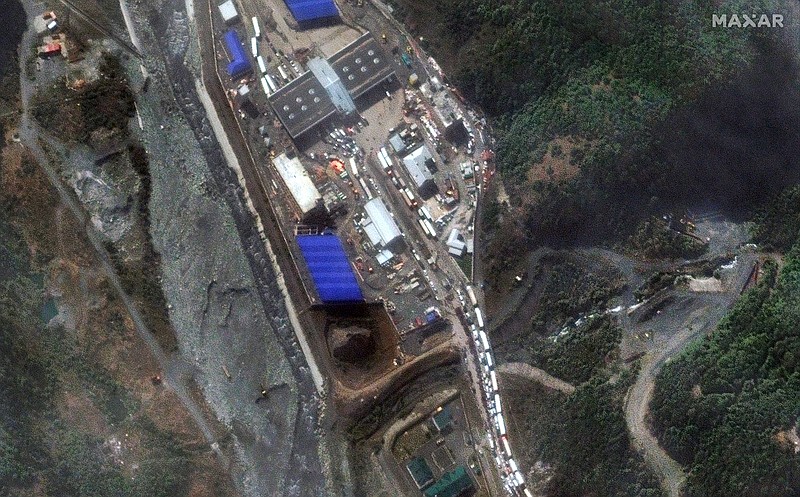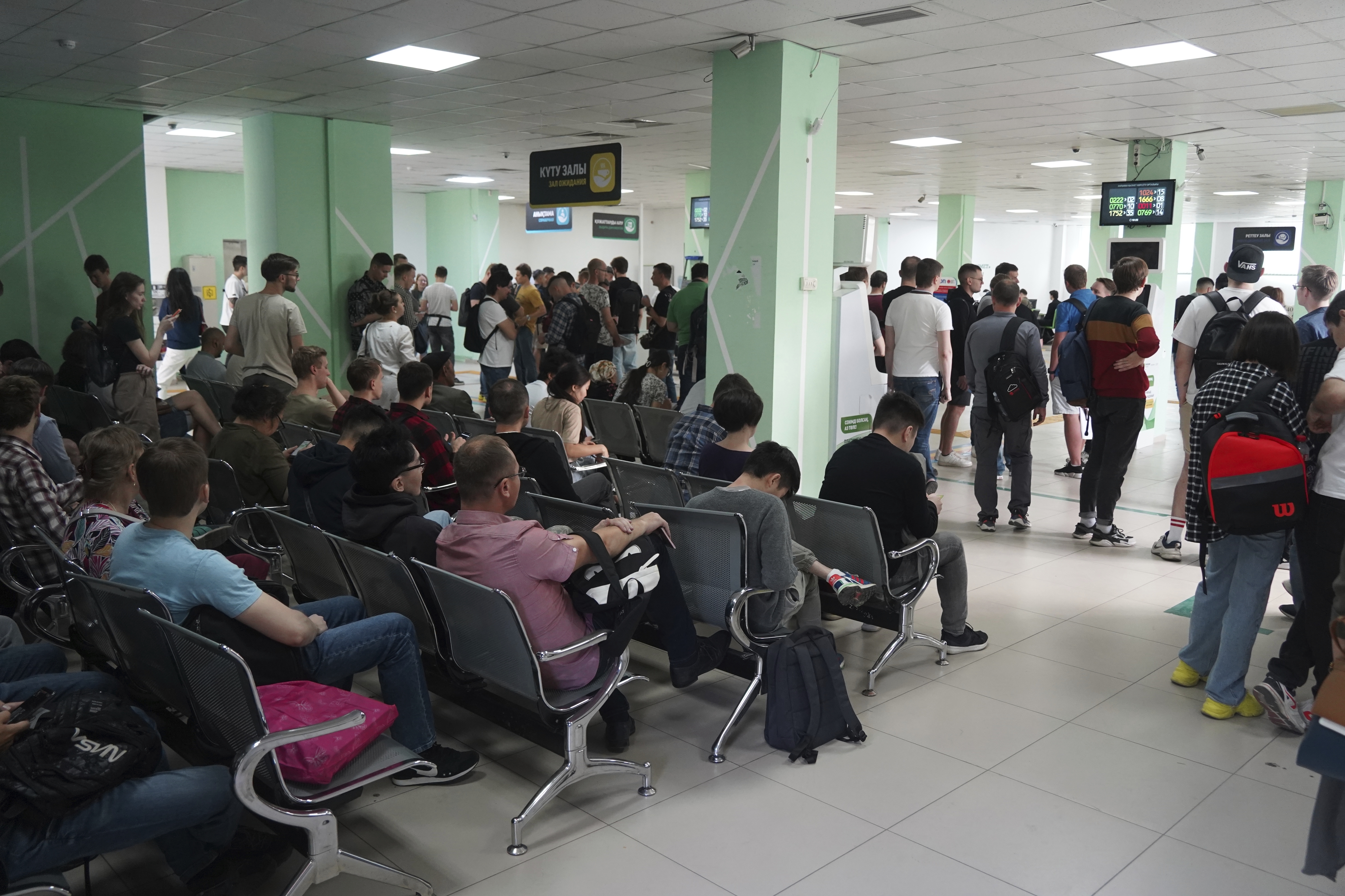TALLINN, Estonia -- More than 194,000 Russian nationals have fled to neighboring Georgia, Kazakhstan and Finland in the week since President Vladimir Putin announced a partial mobilization of reservists.
The mass exodus of men began Sept. 21, shortly after Putin's address to the nation, and continued this week.
Tickets sold out to the few cities that still have direct flights from Russia. But the rest had to gas up their cars and join the long lines snaking on roads toward the borders.
According to the online service Yandex Maps, the traffic jam leading to Verkhny Lars -- a border crossing into Georgia from Russia's North Ossetia region -- stretched for about 9 miles Tuesday. Similarly long lines were reported at some crossings into Kazakhstan.
The Interior Ministry of Georgia said more than 53,000 Russians have entered the country since last week, while Interior Ministry officials in Kazakhstan said 98,000 crossed into that nation. Media reports also state that another 3,000 Russians entered Mongolia, which also shares a border with the country.
The Finnish Border Guard agency said more than 43,000 arrived in the same period.
Finnish authorities said they saw a nearly 80% increase in entries from Russia after the mobilization. But the Finnish Border Guard stated Tuesday that "the majority of arrivals move on to other countries."
Russian authorities sought to stem the flow, barring some men from leaving and citing mobilization laws. The practice did not seem widespread.
The men don't have many options if they don't want to deploy to Ukraine. Russian flights in EU airspace are banned and Baltic nations closed their land borders.
Police in North Ossetia said a makeshift enlistment office will be set up at the Verkhny Lars crossing, and local officials confirmed to the state news agency Tass that Russian men are being served call-up summonses at crossings into Georgia.
Russia's Defense Minister Sergei Shoigu has said only about 300,000 men with prior combat or other military service would be mustered, but reports have emerged from various Russian regions that recruiters were rounding up men outside that description. That fueled fears of a much broader call-up, sending droves of men of all ages and backgrounds to airports and borders.
The Kremlin has described reports of an exodus as overblown, despite growing signs of a backlash to the mobilization. Riot police have arrested hundreds of protesters, and rights groups worry that the order will disproportionately round up men in remote or impoverished parts of the country.
Kazakhstan and Georgia, offering visa-free entry to Russian nationals, seemed to be the most popular destinations for those traveling by land to flee the call-up. Finland and Norway require visas.
Georgia has been somewhat apprehensive about the influx of Russians, especially after the country fought a brief war with Moscow in 2008. Tass reported that more than 5,000 cars were waiting for hours Tuesday at the border with Georgia.
Opposition politicians have demanded the government take drastic actions against the arriving Russians, from introducing visas to banning them completely. No such action has been taken yet.
In announcing the number of Russians crossing the border, Kazakhstan Interior Minister Marat Akhmetzhanov said authorities won't send home those avoiding the call-up unless they are on an international wanted list for criminal charges.
In Kazakhstan, President Kassym-Jomart Tokayev said Tuesday that his country would talk with Moscow about the influx and sought to "maintain agreement with neighboring countries." He called it a "difficult situation" but said there was no reason to panic after tens of thousands of crossings by Russian citizens were reported in recent days.
"We must take care of them and ensure their safety. It is a political and a humanitarian issue. I tasked the government to take the necessary measures," he said.
Information for this article was contributed by Dasha Litvinova and Sophiko Megrelidze of The Associated Press and by Ellen Francis and Mary Ilyushina of The Washington Post.
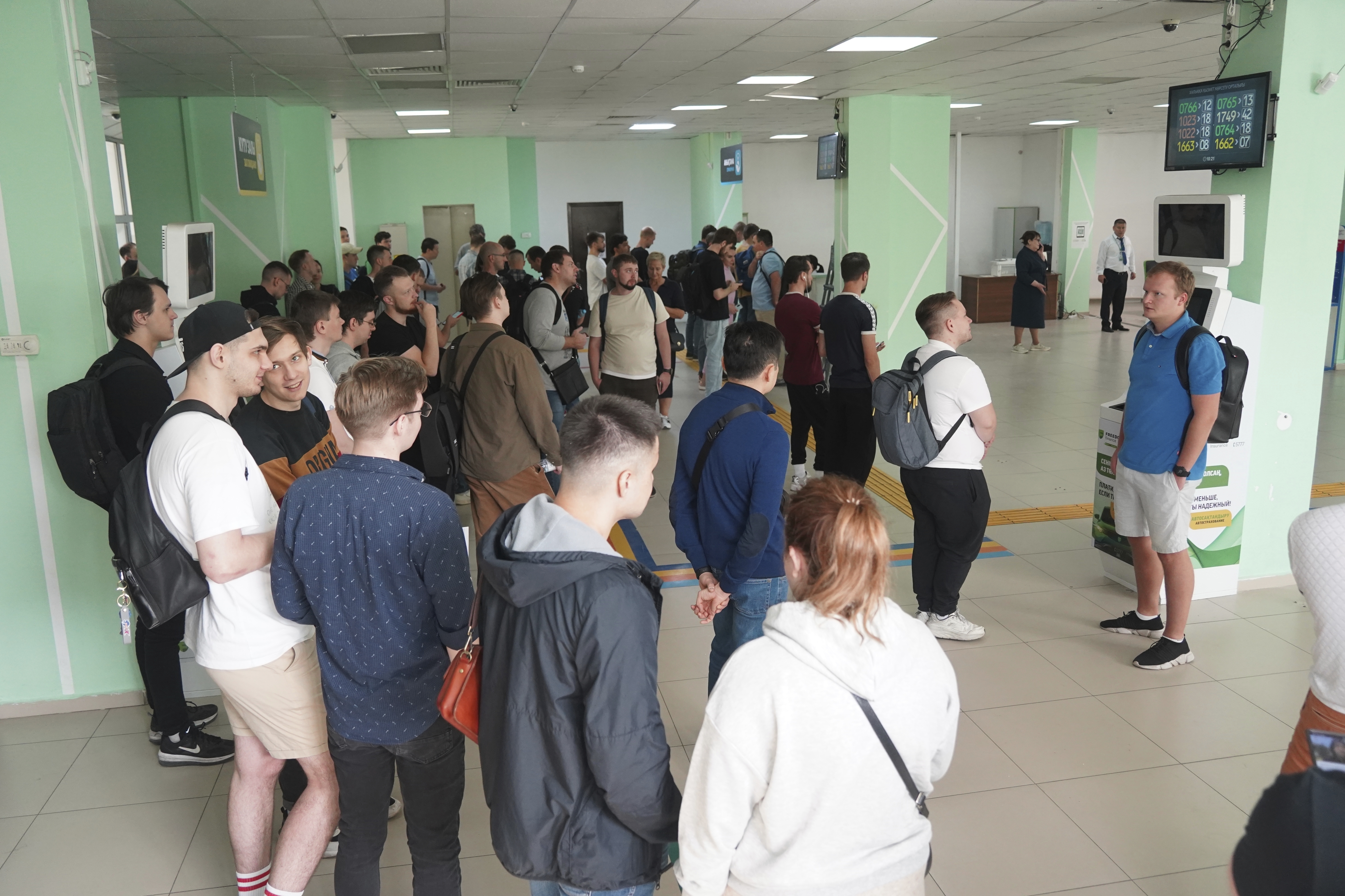 Russians lineup to get Kazakhstan's a Personal Identification Number (INN) in a public service center in Almaty, Kazakhstan, Tuesday, Sept. 27, 2022. A day after President Vladimir Putin ordered a partial mobilization to bolster his troops in Ukraine, many Russians are leaving their homes. (Vladimir Tretyakov/NUR.KZ via AP)
Russians lineup to get Kazakhstan's a Personal Identification Number (INN) in a public service center in Almaty, Kazakhstan, Tuesday, Sept. 27, 2022. A day after President Vladimir Putin ordered a partial mobilization to bolster his troops in Ukraine, many Russians are leaving their homes. (Vladimir Tretyakov/NUR.KZ via AP)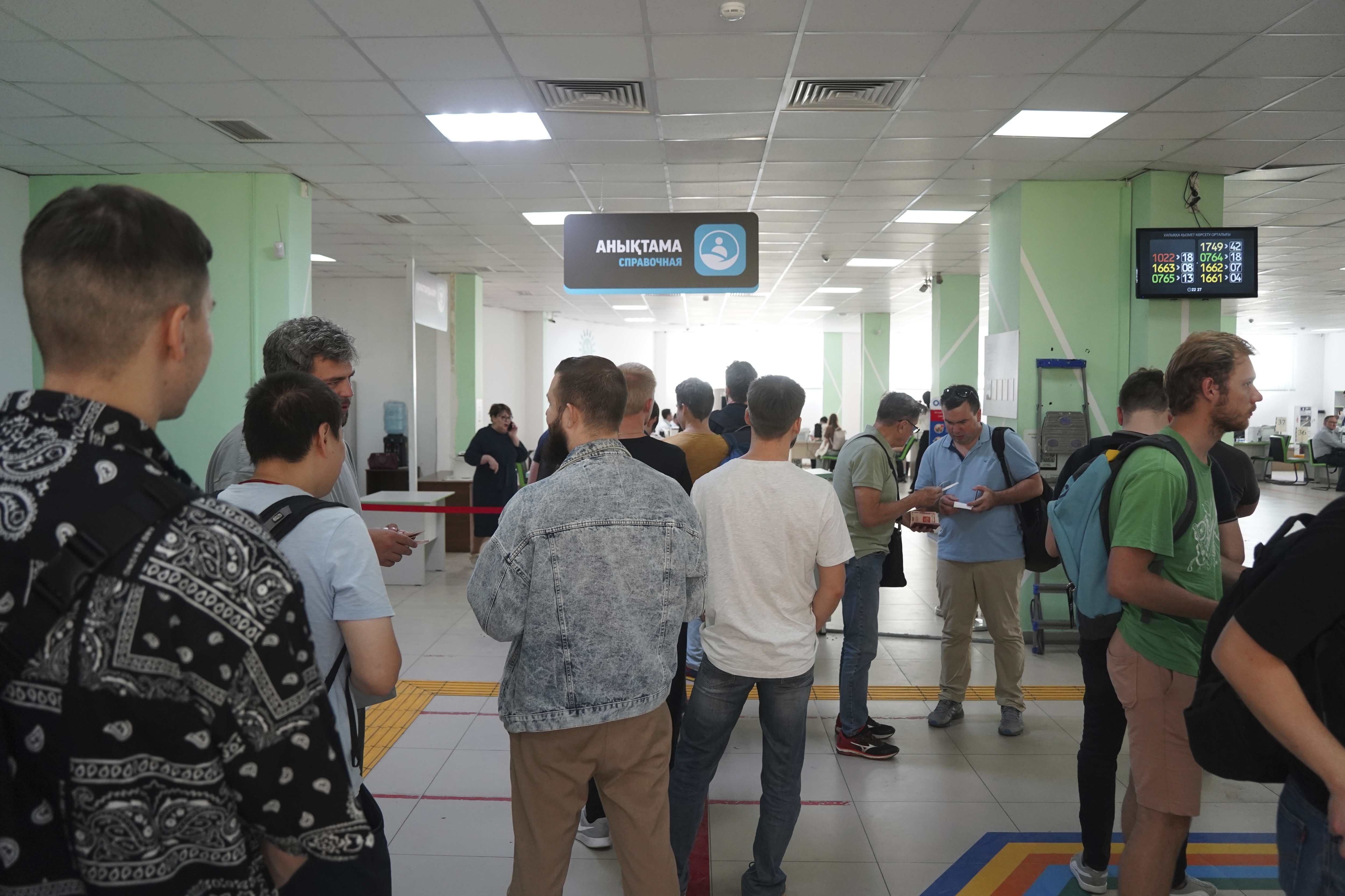 Russians lineup to get Kazakhstan's a Personal Identification Number (INN) in a public service center in Almaty, Kazakhstan, Tuesday, Sept. 27, 2022. A day after President Vladimir Putin ordered a partial mobilization to bolster his troops in Ukraine, many Russians are leaving their homes. (Vladimir Tretyakov/NUR.KZ via AP)
Russians lineup to get Kazakhstan's a Personal Identification Number (INN) in a public service center in Almaty, Kazakhstan, Tuesday, Sept. 27, 2022. A day after President Vladimir Putin ordered a partial mobilization to bolster his troops in Ukraine, many Russians are leaving their homes. (Vladimir Tretyakov/NUR.KZ via AP)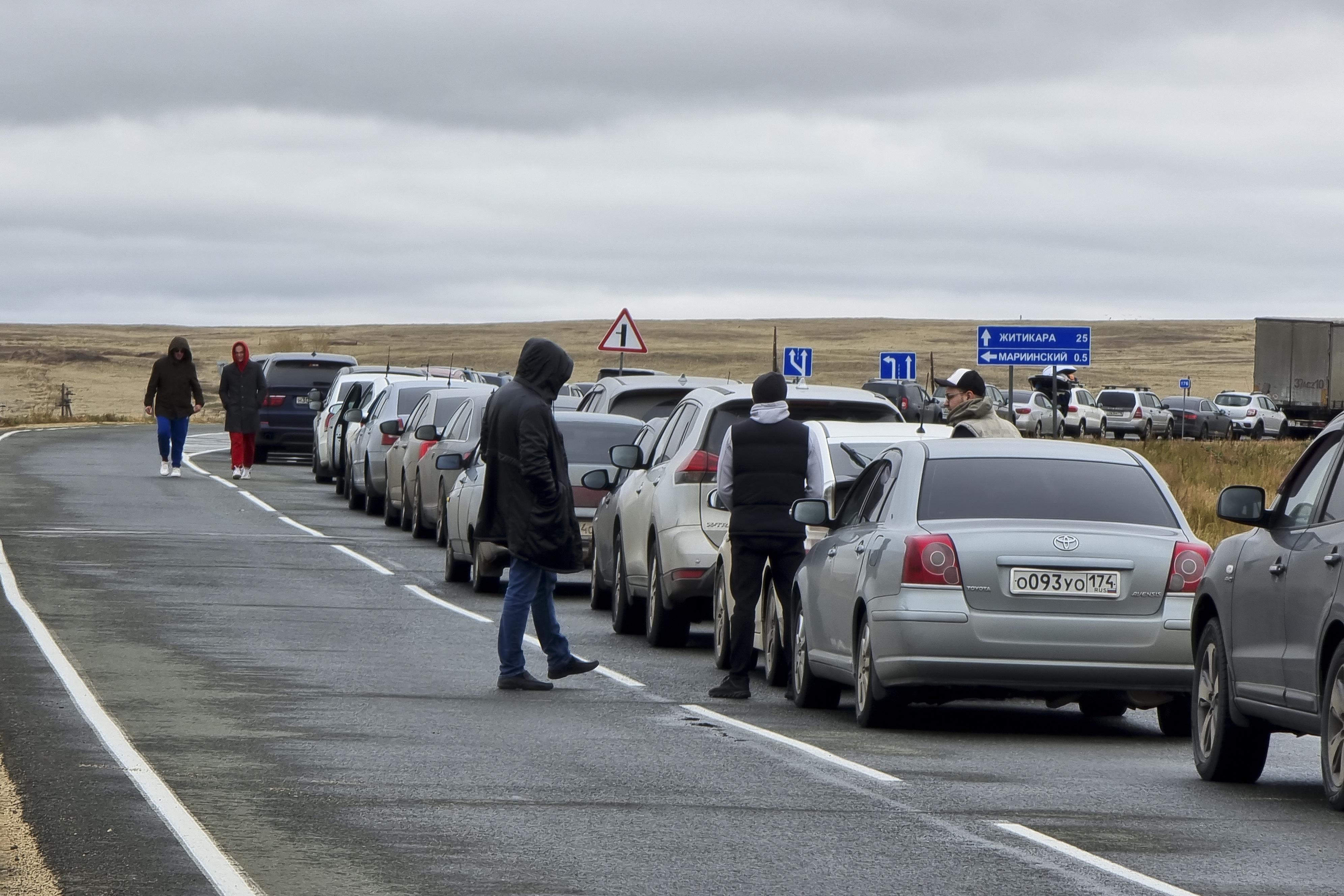 People walk next to their cars queuing to cross the border into Kazakhstan at the Mariinsky border crossing, about 400 kilometers (250 miles) south of Chelyabinsk, Russia, Tuesday, Sept. 27, 2022. Officials say about 98,000 Russians have crossed into Kazakhstan in the week since President Vladimir Putin announced a partial mobilization of reservists to fight in Ukraine. (AP Photo)
People walk next to their cars queuing to cross the border into Kazakhstan at the Mariinsky border crossing, about 400 kilometers (250 miles) south of Chelyabinsk, Russia, Tuesday, Sept. 27, 2022. Officials say about 98,000 Russians have crossed into Kazakhstan in the week since President Vladimir Putin announced a partial mobilization of reservists to fight in Ukraine. (AP Photo)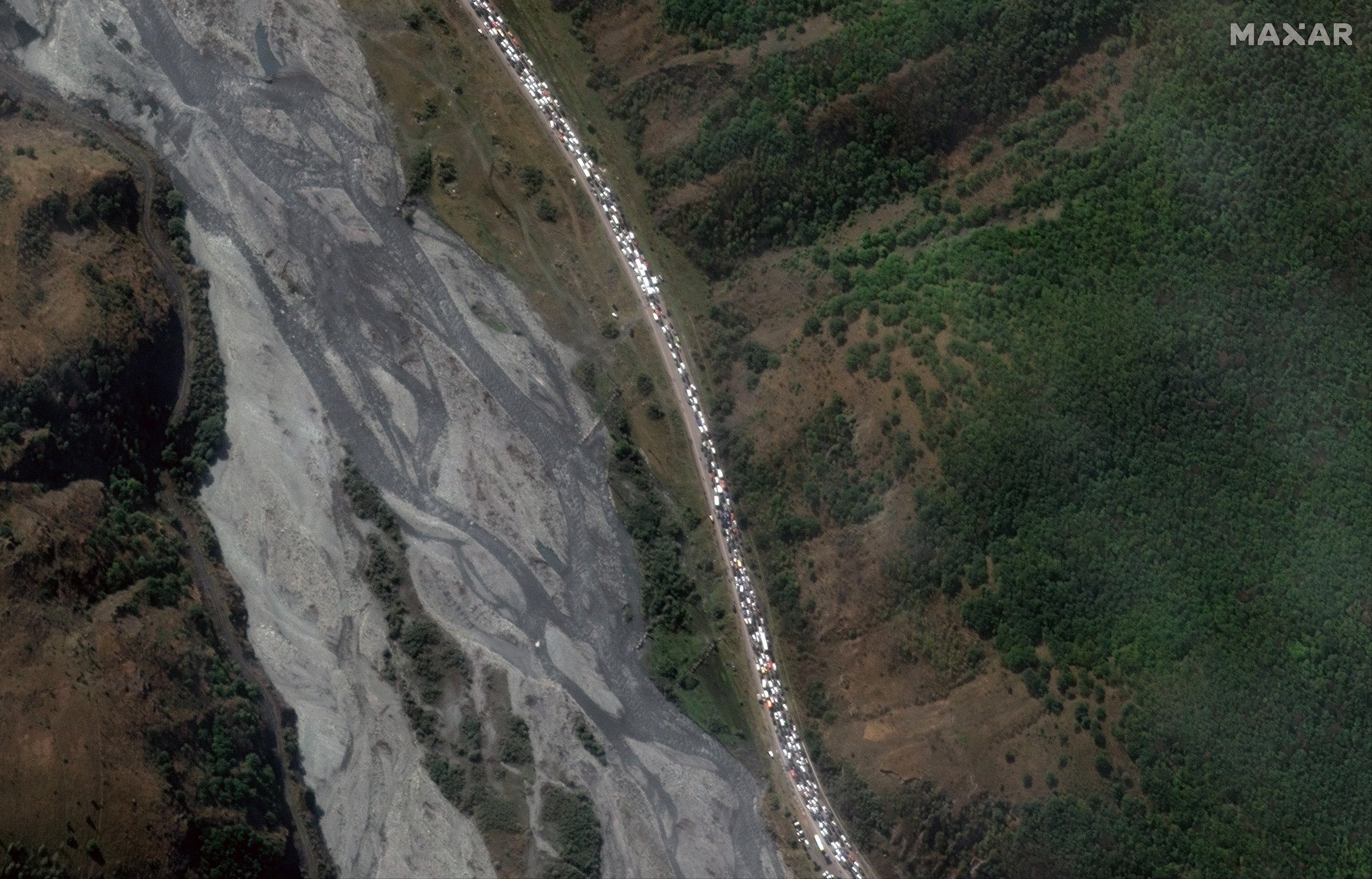 This satellite image provided by Maxar Technologies shows people and vehicles queuing for crossing the Upper Lars checkpoint on the Russian-Georgia border, on Tuesday Sept. 27, 2022, after Russian President Vladimir Putin announced a partial mobilization in Russia. (Satellite image ©2022 Maxar Technologies via AP)
This satellite image provided by Maxar Technologies shows people and vehicles queuing for crossing the Upper Lars checkpoint on the Russian-Georgia border, on Tuesday Sept. 27, 2022, after Russian President Vladimir Putin announced a partial mobilization in Russia. (Satellite image ©2022 Maxar Technologies via AP)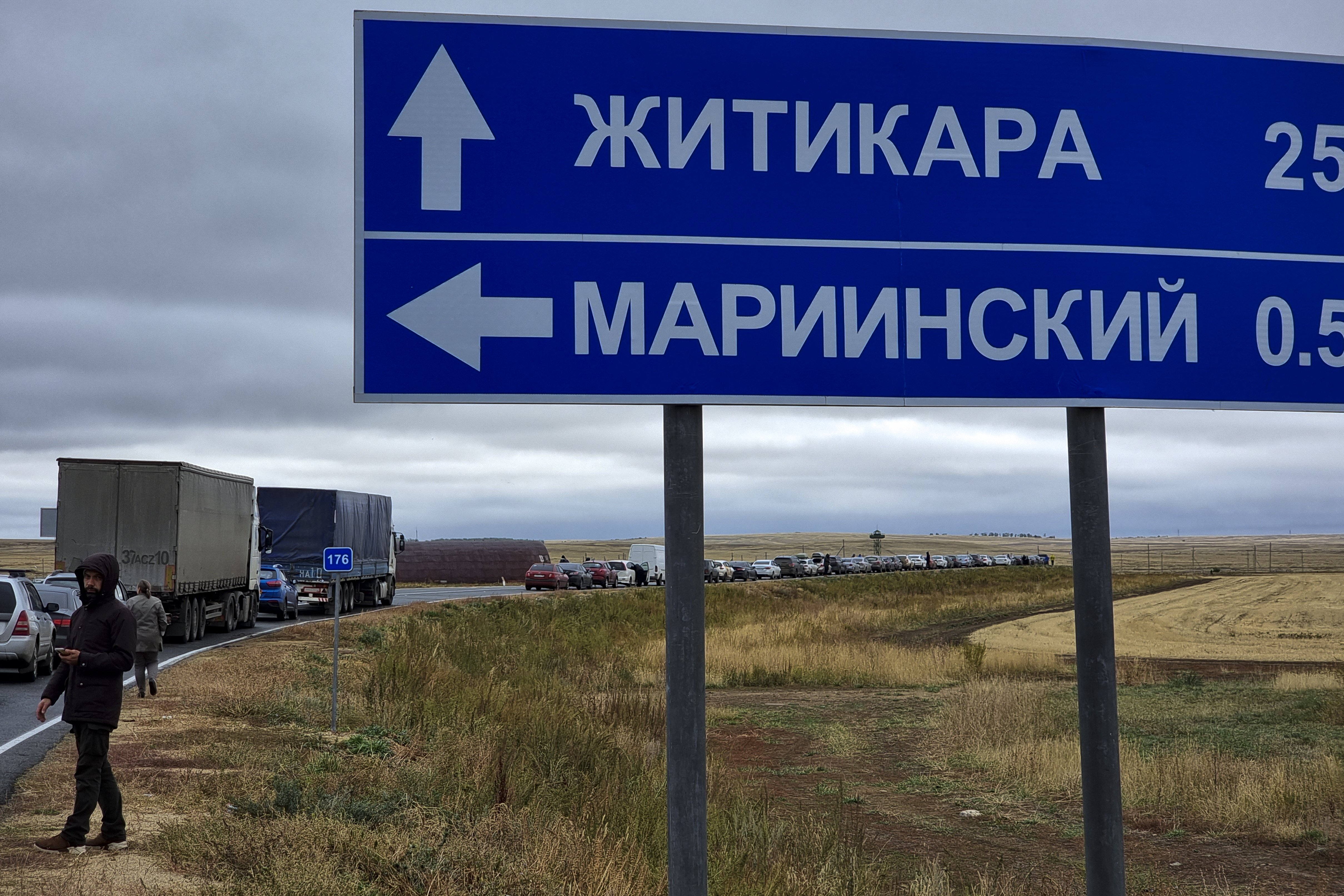 Cars queuing to cross the border into Kazakhstan at the Mariinsky border crossing, about 400 kilometers (250 miles) south of Chelyabinsk, Russia, Tuesday, Sept. 27, 2022. Officials say about 98,000 Russians have crossed into Kazakhstan in the week since President Vladimir Putin announced a partial mobilization of reservists to fight in Ukraine. (AP Photo)
Cars queuing to cross the border into Kazakhstan at the Mariinsky border crossing, about 400 kilometers (250 miles) south of Chelyabinsk, Russia, Tuesday, Sept. 27, 2022. Officials say about 98,000 Russians have crossed into Kazakhstan in the week since President Vladimir Putin announced a partial mobilization of reservists to fight in Ukraine. (AP Photo)